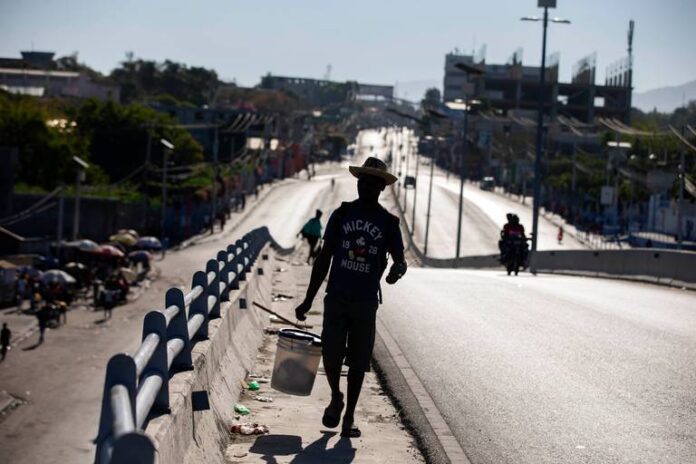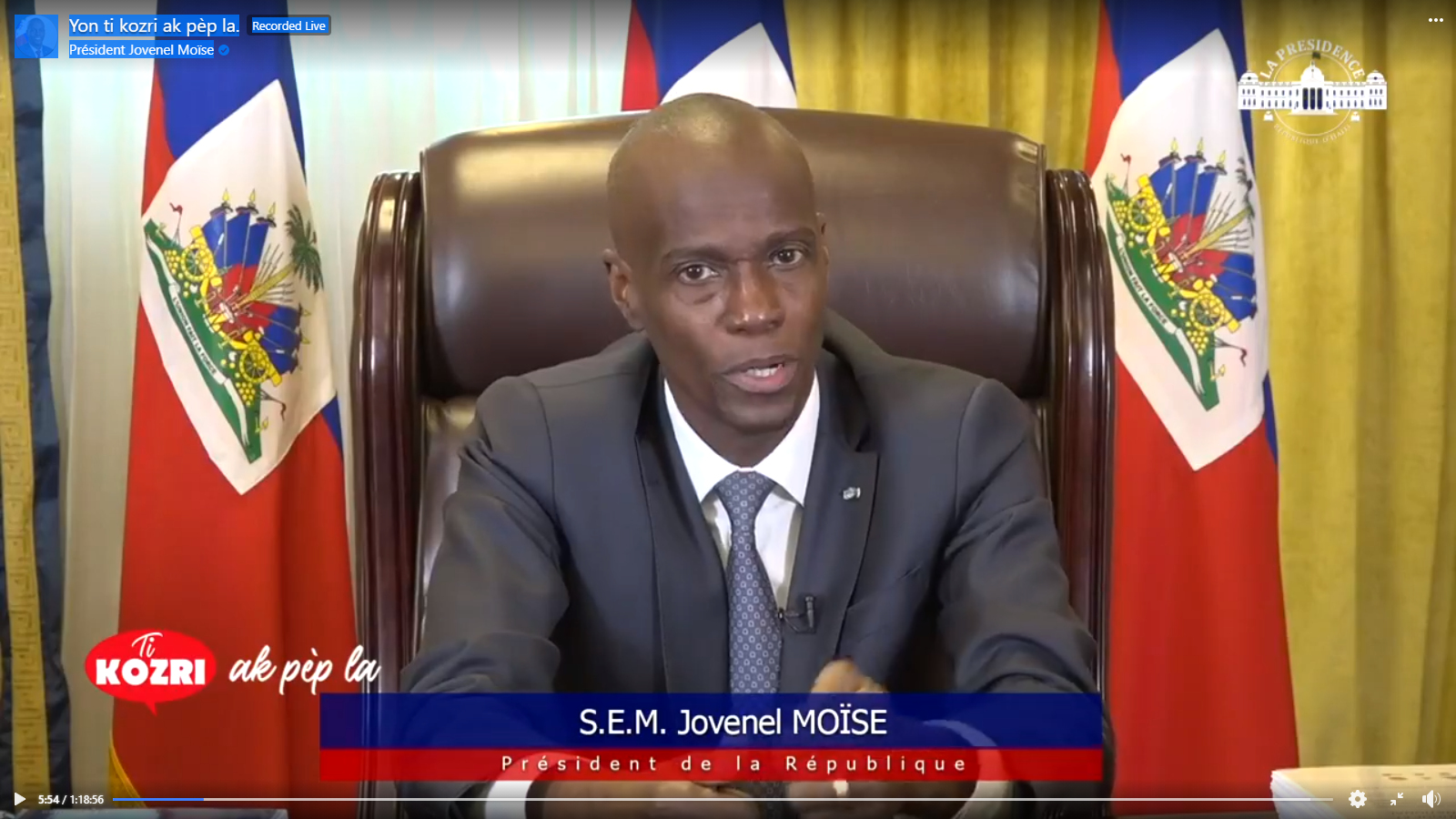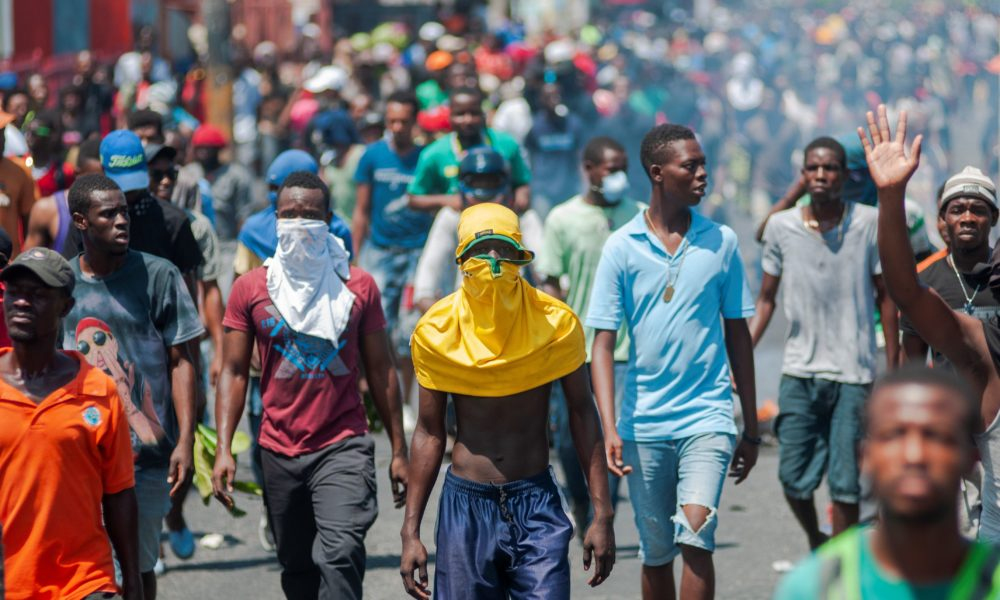
The usually clogged and bustling streets were empty in Haiti’s capital, Port-au-Prince, as well as other cities like Cap Haïtien in the North and Les Cayes in the South, as a general strike called by Haiti’s unions and supported by the opposition brought industry, transportation, and commerce to a nationwide standstill on Feb. 1 and 2.
It was a replay of the extended “peyi lòk” (locked up country) demonstrations which almost drove President Jovenel Moïse from power in late 2019. The difference this time is that, according to Haiti’s 1987 Constitution, Moïse must step down on Feb. 7.
While Moïse and the opposition have argued since the start of his term about whether that departure should be the Feb. 7 of 2021 or 2022, Haiti’s Bar Association (FBH) seems to have finally put the matter to rest. In a six-page Jan. 30 resolution, the body concluded that what’s good for the goose is also good for the gander.
In legal terms, President Moïse is subject to the same “restrictive interpretation [of the Constitution] imposed on parliamentarians on Jan. 13, 2020,” when Moïse forced all of the Deputies and two-thirds of the Senators to resign and began ruling by decree, the FBH wrote.

As a result, “the mandate of President Jovenel Moïse must end on Feb. 7, 2021, i.e. ‘five years … following the date of the elections’” and “the Provisional Electoral Council unilaterally appointed by President Jovenel Moïse has no legitimacy to organize the next electoral calendar.”
The next day, the two principal wings of Haiti’s constantly uniting and the fracturing opposition – the Political Direction of the Democratic Opposition (DIRPOD) and the Dessalines Children Platform (PPD) of former Sen. Moïse Jean-Charles – along with a smaller, newer coalition known as the National Front for Democracy (FND), announced the Terrace Garden Final Accord, which created the “National Commission for the Establishment of the Transition (CNT) composed of 15 members as follows: Seven members of civil society… [and] eight members from the political parties, groups, and groupings of the opposition.” (An outlier in recent years, the Lavalas Family party of former president Jean-Bertrand Aristide did not sign the accord.)
The CNT is tasked with appointing before Feb. 7 “as President a Supreme Court [Court de Cassation] judge, regularly appointed, deemed to be honest, deemed capable of respecting the [transition’s] roadmap, and against whom no charges of action contrary to the rule of law have been levied.” If it fails to find a suitable judge, the CNT “will choose from among one of the powers that the Commission has deemed duly established or any other suitable institutional solution. This procedure will be adopted and applied by the Commission by consensus or by a 2/3 majority vote.”
“the mandate of President Jovenel Moïse must end on Feb. 7, 2021, i.e. ‘five years … following the date of the elections’”
For the Prime Minister (Haiti’s most powerful executive post), all the opposition groups who signed the Terrace Garden Final Accord will present the CNT with a list of candidates. The CNT’s supposedly separate civil society and political wings then chooses seven of the candidates, votes for one of them, and then submits their choice for approval to the president they have just chosen.
As the Terrace Garden Final Accord was unveiled, anti-government demonstrations were taking place not only in the capital but in other cities like Cap Haïtien, Saint-Marc, and Pétionville and rural towns including Mirebalais and Verrettes.
In the face of these developments, on Feb. 1, Jovenel Moïse again took to the airwaves as he did exactly one week earlier, to make a one hour 19 minute rambling and at times incoherent video address to the nation, trying to blunt the growing movement against him. He vowed that he would remain in office to respect the “will of the Haitian people.”
“Jovenel Moïse doesn’t have power,” he said. “That master is not the big shot who sits plotting or writing a nice declaration so that he can seize power. Power has only one master. That master is called: the Haitian people. That means the 12 million who live in Haiti and the four million living in the diaspora.”
Concerning his dismantling of Haitian state institutions and rewriting the Constitution, he said: “When I speak, I want you to understand that this system which I found here, which I said I would destroy, it’s not me who is destroying it, it’s you, the Haitian people, since you put me here to destroy it.”
He also claimed that “the way I see things going, by the end of February, if not mid-February, we will be completely out of this coronavirus thing.” Haiti has not yet received any vaccines and has seen a spike in Covid-19 cases over the past month, registering 187 cases on Jan. 26, according to the John Hopkins Coronavirus Research Center.
Most importantly, Moïse’s new chief of police Léon Charles has been very aggressive against demonstrators, just as he was against anti-coup anti-occupation uprisings in 2005, which is the reason he’s been reactivated.

Human rights lawyer Mario Joseph, who heads the International Lawyers Office (BAI), spoke out against the police repression in a Jan. 27 press conference. “The BAI is extremely concerned that the corrupt PHTK [Haitian Bald Headed Party] government has weaponized the PNH [Haitian National Police] to use bullets, teargas, physical aggression, arbitrary arrests, and imprisonment to crush popular protests,” Joseph said.
On Feb. 2, Jovenel Moïse lost an ally whose defection almost always is a harbinger of a regime’s fall: the Catholic Church. “It seems to us that everyone agrees that no one is above the law and the constitution in the country,” wrote Haiti’s 10 bishops in an open letter, noting, like the Bar Association, that through his actions in January 2020, the president had “affirmed the unity of the law for all elected officials, including himself.”
“The country is on the verge of explosion,” the bishops continued. “The daily life of the people is death, assassinations, impunity, insecurity. Discontent is everywhere, in almost all areas. Many enraging topics, such as: how to establish a Provisional Electoral Council, how to write another constitution, etc. So it is not only the ravages of kidnapping that make the country totally unlivable. Should we accept or tolerate this?”
In 1986, it was the Catholic Church’s open divorce from Jean-Claude “Baby Doc” Duvalier’s dictatorship which quickly brought about his flight from the country on Feb. 7 of that year, thereby establishing the start-date of a repeatedly betrayed democracy which Jovenel Moïse is now being called on to respect.
One week before Baby Doc fled the country, he declared on television that he would remain in power “as strong as a monkey’s tail.” Today, Haitians everywhere are now waiting to see if Feb. 7 this year will look anything like that of 35 years ago.










